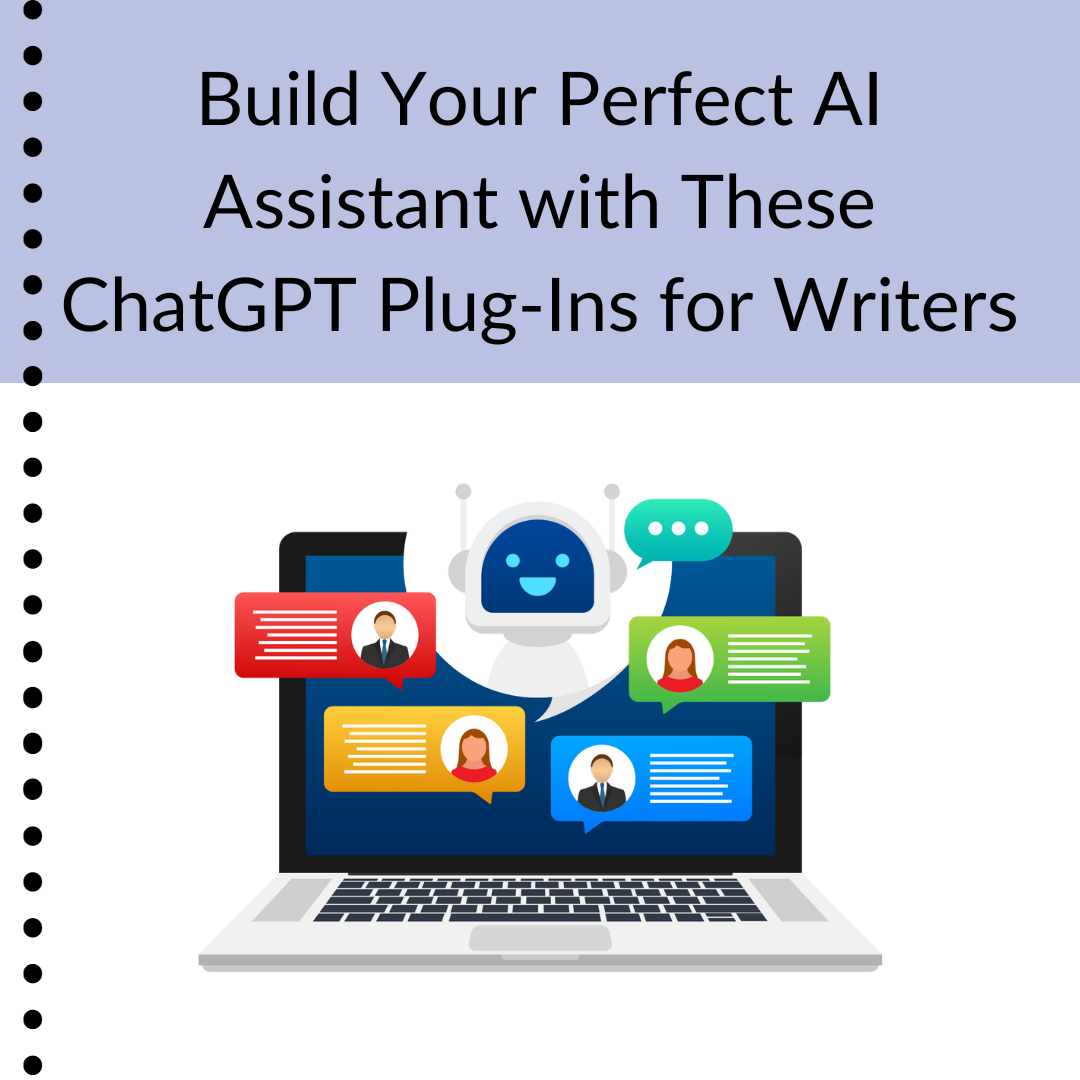What Is A Plug-In?
Plug-ins are pieces of software that add new features or extend the functionality of an existing application. Plug-ins are extensions that integrate with software or websites, meaning you won’t need to exit the application to access the additional features. The application’s developer and others with programming knowledge generally can create plug-ins of their own, though the ability to do so varies from program to program, but users don’t need to have a programming background to use them.
For authors wanting to use AI in their businesses, plug-ins can open the doors to entirely new creative opportunities. Read on to explore several ChatGPT plug-ins tailored to writing and publishing and evaluate their ease of use, benefits, and potential drawbacks.
The Basics
To use plug-ins on ChatGPT, you must be subscribed to ChatGPT Plus, which costs $20 a month. ChatGPT Plus also grants you access to GPT-4, OpenAI’s newest large language model. After subscribing, you can select “Plug-ins (Beta)” from the pop-up menu and explore the Plug-In Store. After selecting a plug-in, confirm installation, and enable the plug-in to begin using it. You can only install up to three plug-ins at a time. As with all applications, you’ll also want to verify the function of the plug-in and its creator, and consider if it is safe and ethical to use before installing.
Plug-ins installed on ChatGPT function the same way the basic platform does, requiring users to input prompts in order to “chat” with the application. The application will attempt to provide you with the data you need based on your plug-ins. ChatGPT also includes the option to target a plug-in by including it in the prompt. If your results don’t appear to be specific enough, you can ask the program to complete a task and direct it to a particular plug-in by name—for example, “Help me find a review on this book using A Review Summary.”
Now that you understand how to install and activate plug-ins, we’ll cover a few that authors might find useful.
Timeport
Perfect for the average Speculative Fiction writer, with Timeport, ChatGPT can become a speculative time travel game, imagining scenes, environments, scenarios, people, and things from somewhere in the future. Timeport can spit out details that are excellent for shaking loose the mentally stuck writer’s creative reserves. An article by PCMag about Timeport identifies text outputs after a user prompted, “I want to travel to the year 5000.” The result was a paragraph of ample description that included hovering vehicles, holographic communicators, and nano-technology—all things befitting a story set in the future. Timeport may not be the best plug-in if you want cold-hard facts, but if you’re a Sci-Fi author desperate to dislodge an underperforming imagination, Timeport might be worth exploring.
Pro Tip: If you ever get stuck, remember Timeport is an add-on to ChatGPT and can receive prompts just like the base AI program. When in doubt, simply ask the chatbot, “What do I do next?”
AI Quest
Similar to Timeport, AI Quest produces a text-based adventure based on your prompts. Are you looking for a Romantic Comedy in the style of Tim Burton? AI Quest will ask you for a name and age range, then subject and style. It will follow up with text descriptions of the scenario and a set of choices you can make. Once you’ve decided the path you’d like to explore, you can enter it and let ChatGPT guide you.
While Timeport aims to deliver ideas about a specific time period, AI Quest will output a literal quest laden with details for you to use. If you have a story that’s partially written or outlined but you’re stuck on where to go next, AI Quest could help you explore the next steps your characters could take.
If you’re concerned about your intellectual property becoming part of the overall language model, consider removing specific details about your story from your prompt, such as names, places, and unique ideas. Keeping it bare-bones may still be enough for the program’s results to spark inspiration.
Pro Tip: AI Quest is a facet of ChatGPT, meaning it can remember your historical queries within ChatGPT. Want to try a different set of outcomes but don’t want to re-type your previous prompts? Ask ChatGPT to “remember” your last output—then ask it for another variation using that output.
A Review Summary
As authors, we are accustomed to looking at reviews, but analyzing a large collection of them can be time-consuming. If you wanted only a summarized version of the best and worst reviews on a specific Amazon listing or need a breakdown of what readers are saying about your books from a sky-level view, A Review Summary might be the answer.
To use the plug-in, simply ask for “a summary review” of a product on Amazon using a prompt in ChatGPT, and the plug-in will import and summarize a few notable reviews that contain a rating.
Beyond studying their own books, authors might find value in importing multiple prompts for reviews of similarly written books—such as books in the also-bought section or those by comparative authors—and asking ChatGPT to point out what readers are saying similarly across them. The results may highlight tropes or frequently noted keywords readers input in their reviews.
Pro Tip: In the end, we must be responsible for our own research, and relying on ChatGPT’s outputs to be accurate one hundred percent of the time is not a good move. Always double-check your findings. ChatGPT can save us time, but it cannot replace an author with a strong attention to detail.
A Note on AI Ethics
With any AI-generated output, be sure to double-check your work, fact-check when needed, and otherwise ensure your writing is of the caliber you desire. Take care you are using programs ethically and legally—don’t upload other creatives’ work into a platform without permission, and keep up-to-date on discussions about the use of AI. Know that the conversations around AI are constantly shifting and adapting as the programs continue to evolve.
Plug-ins are the bits at the end of your drill chuck; the right bit fits the right screw. There is an amalgamation of plug-ins being developed on the regular, and jumping into modifying an already intense application like ChatGPT can be daunting. However, by keeping focused on what you need and experimenting with the options available, you can determine which plug-ins best suit your needs and find a combination that works for your author business.

